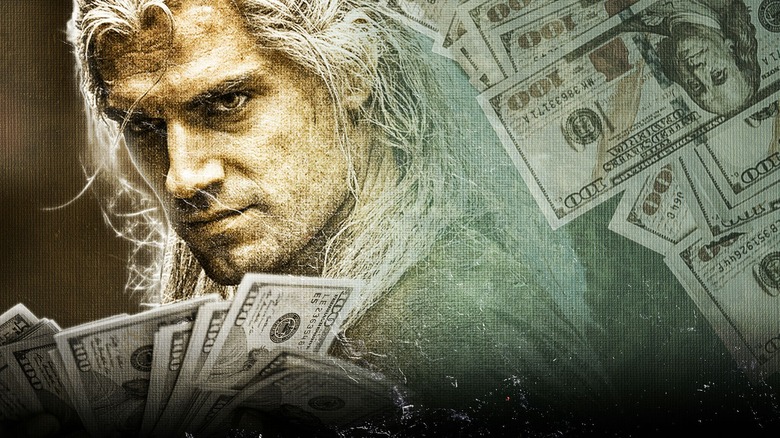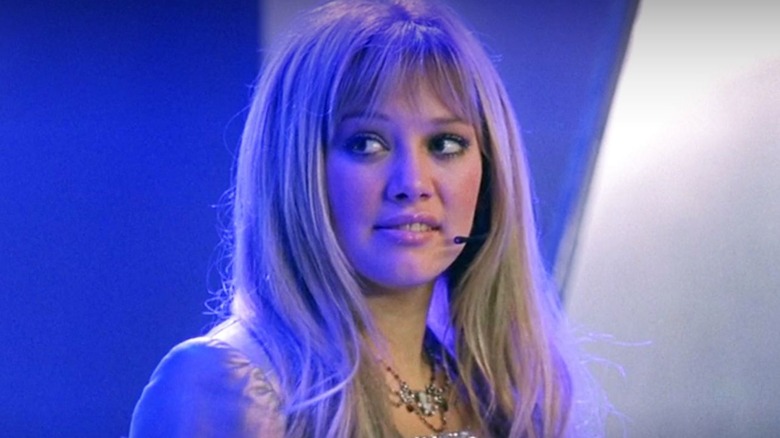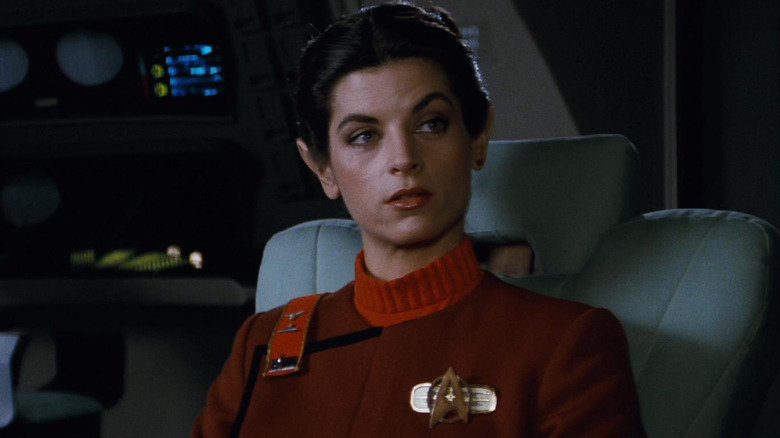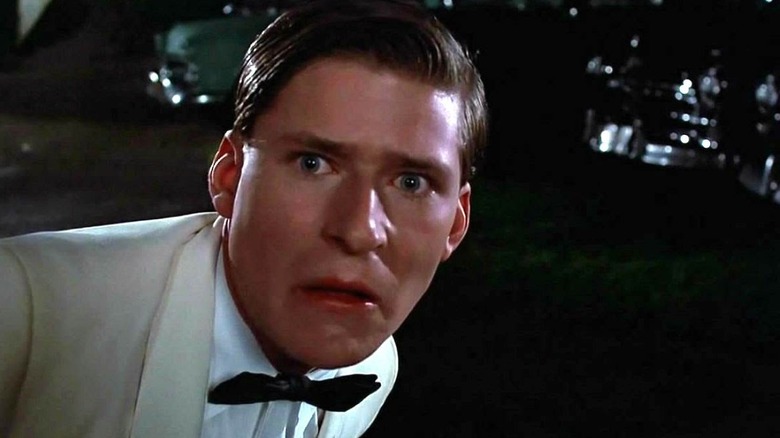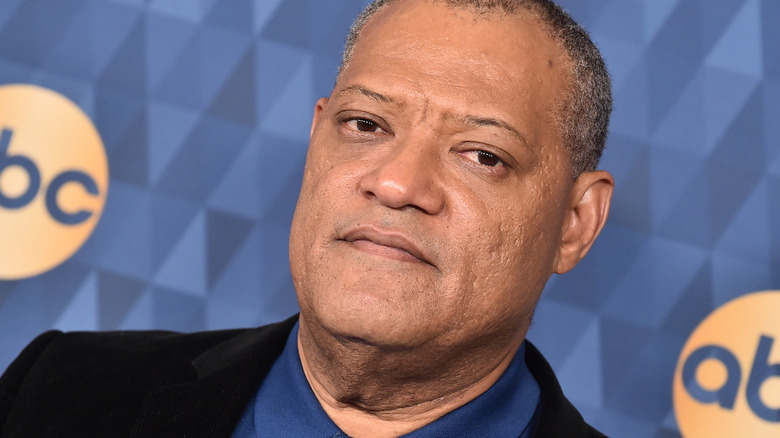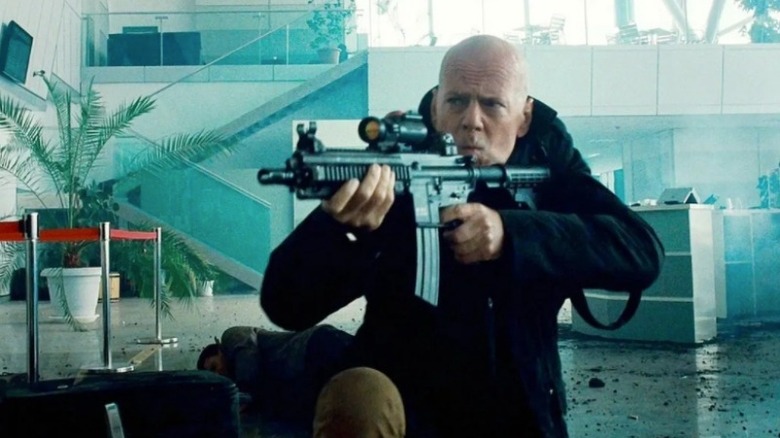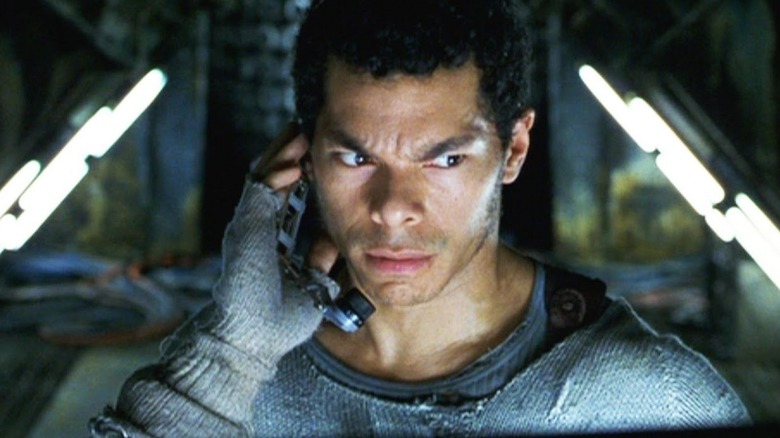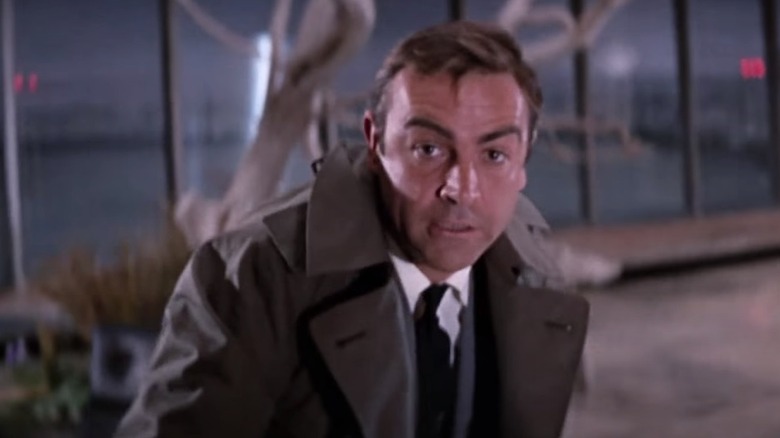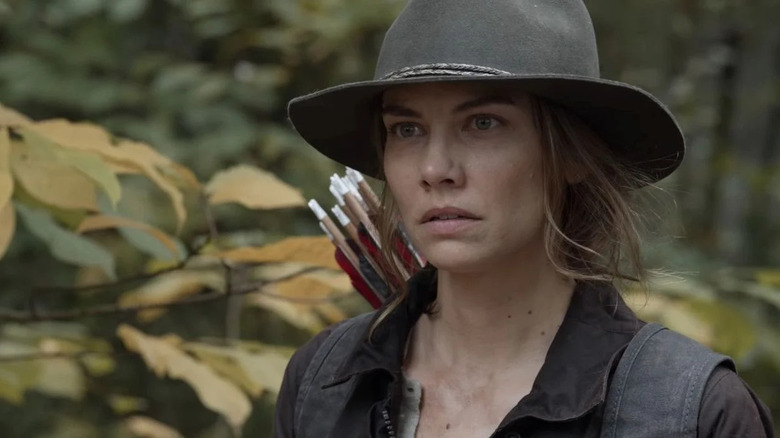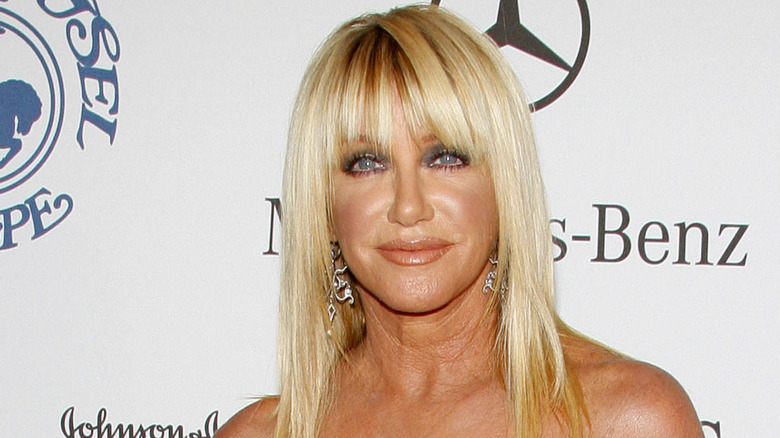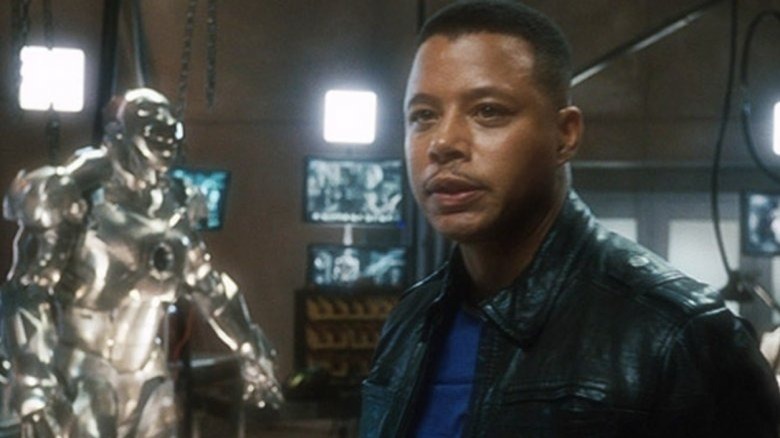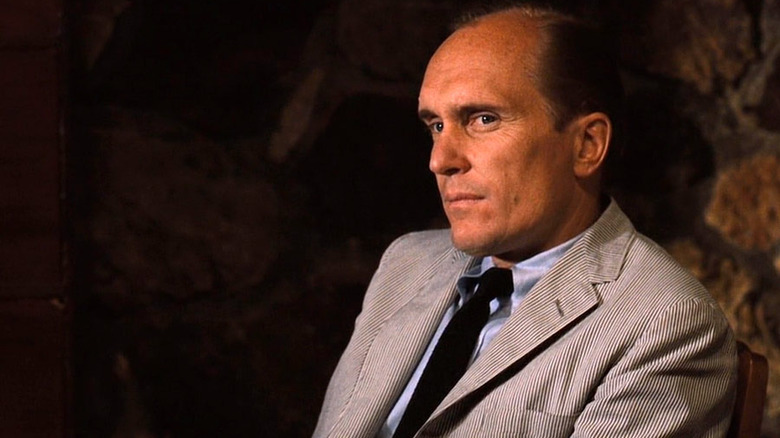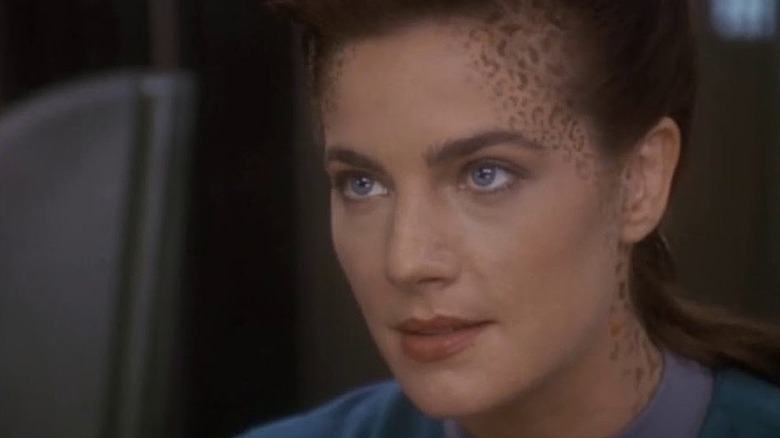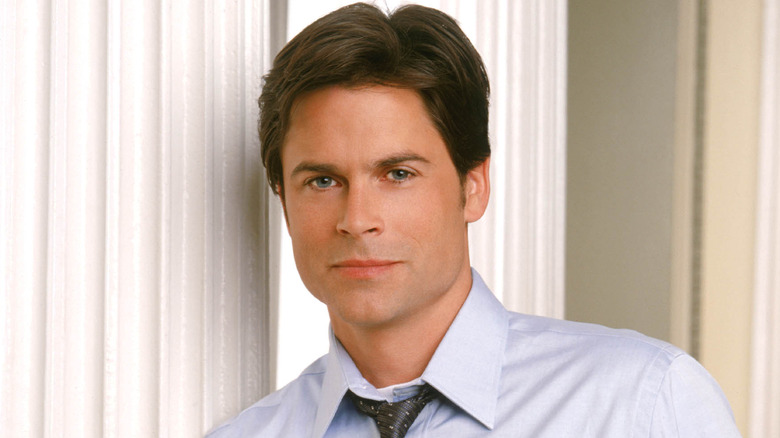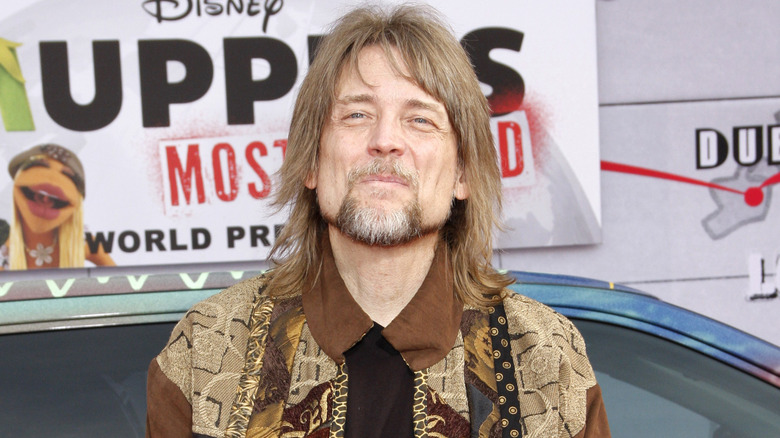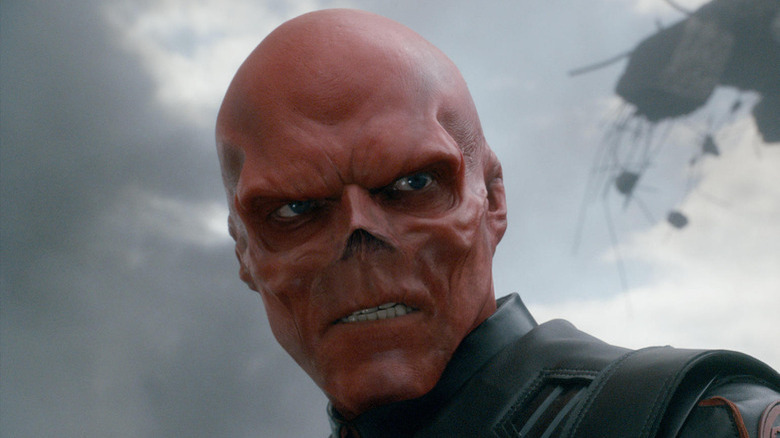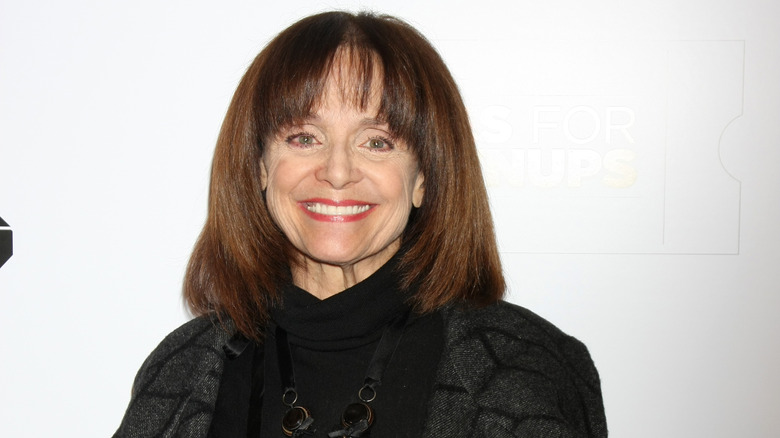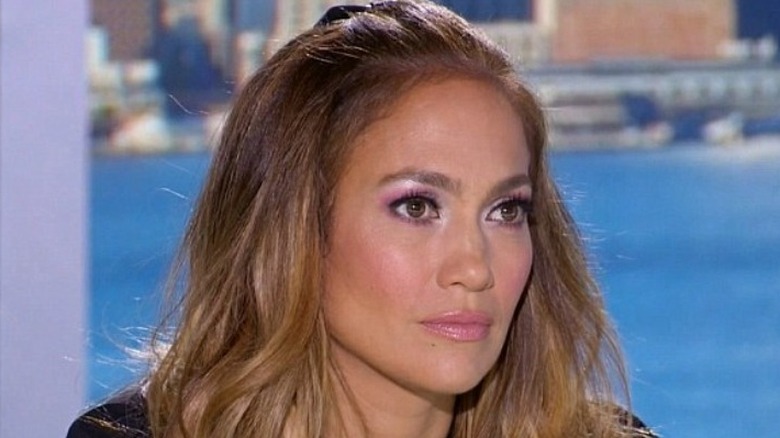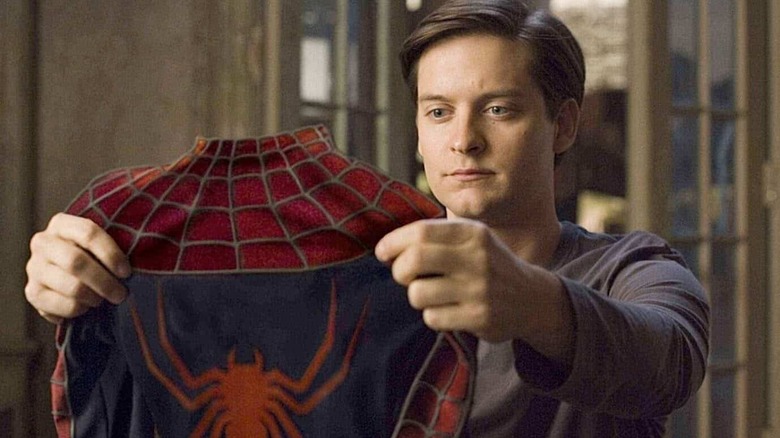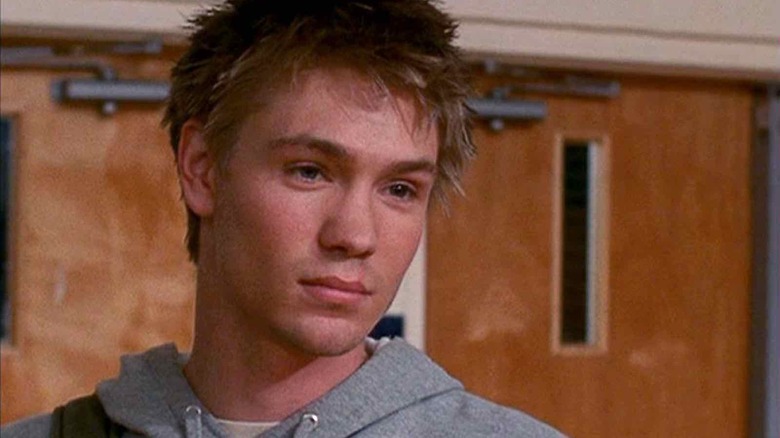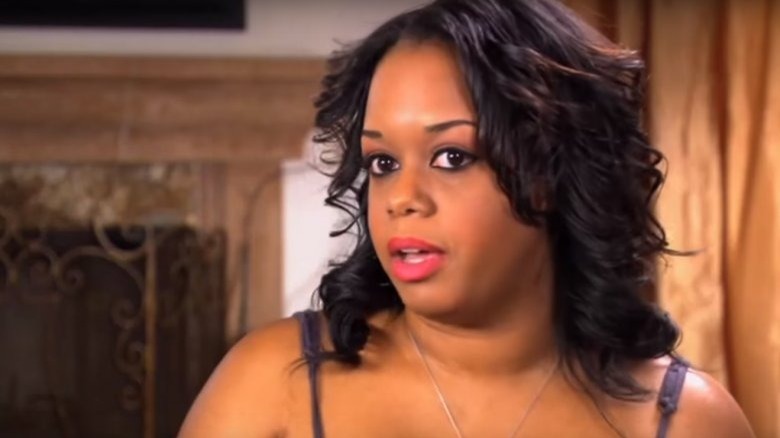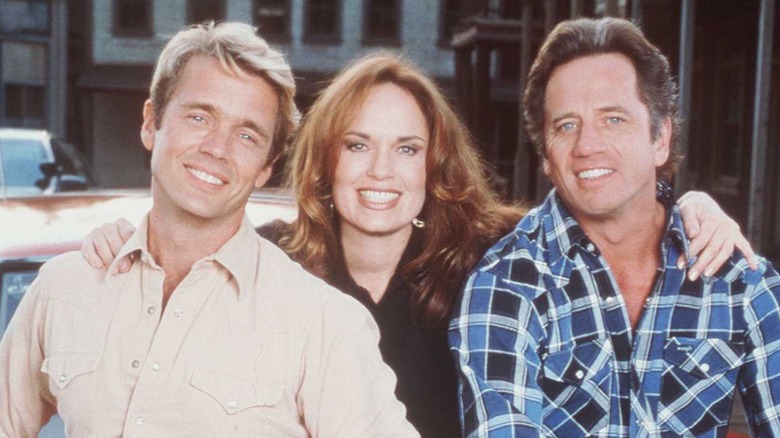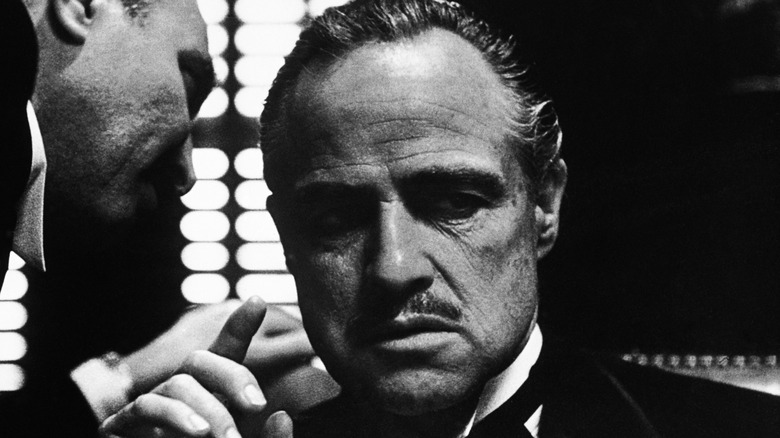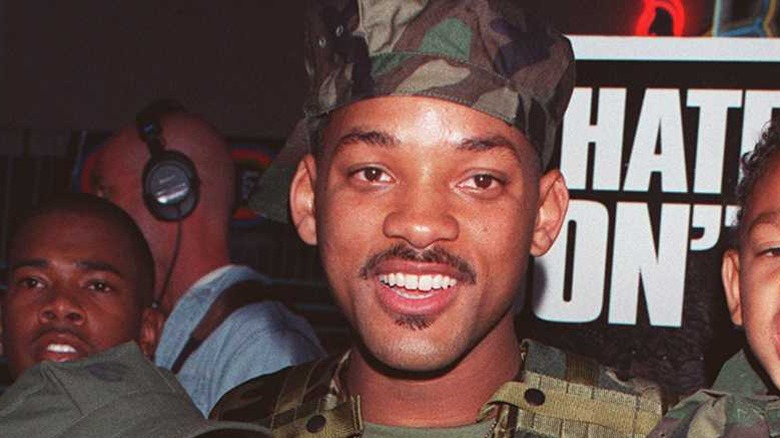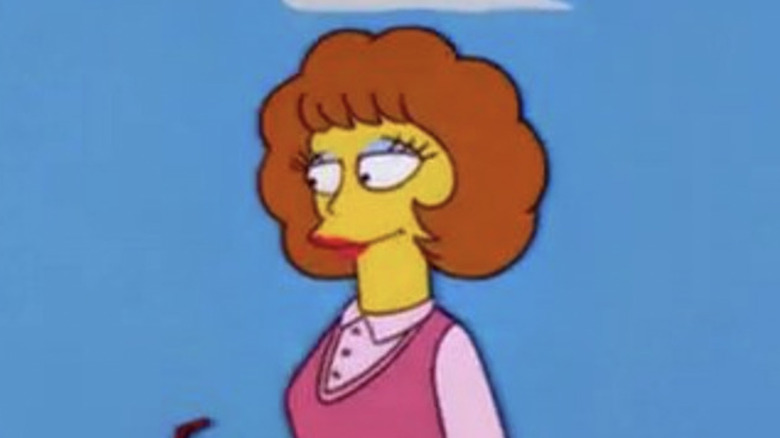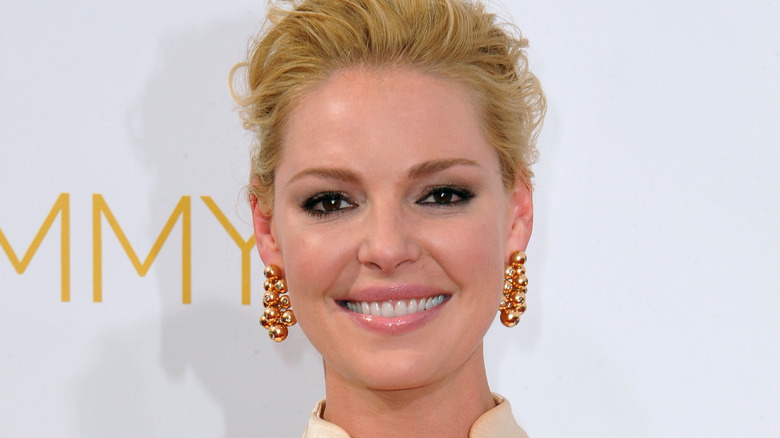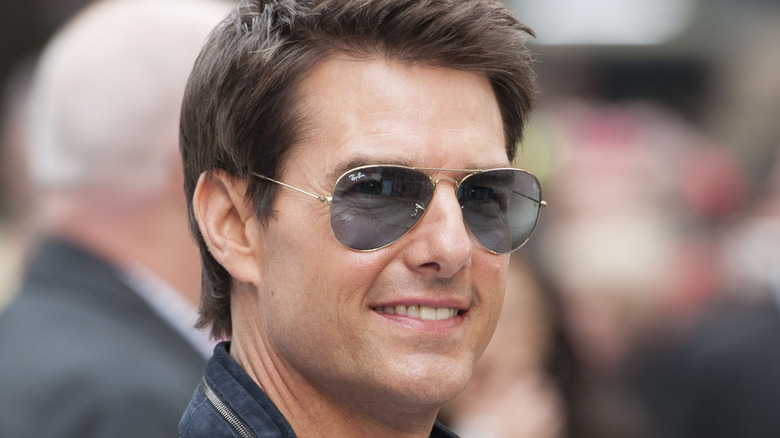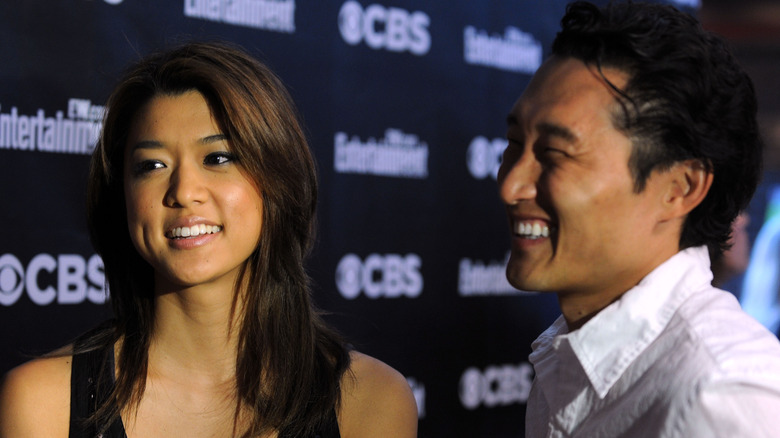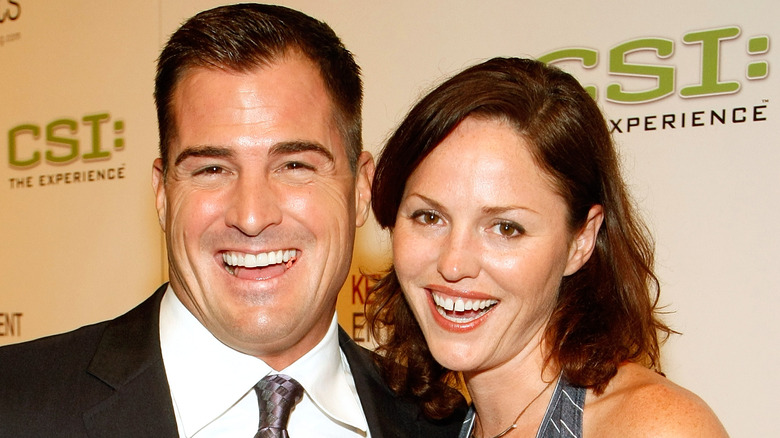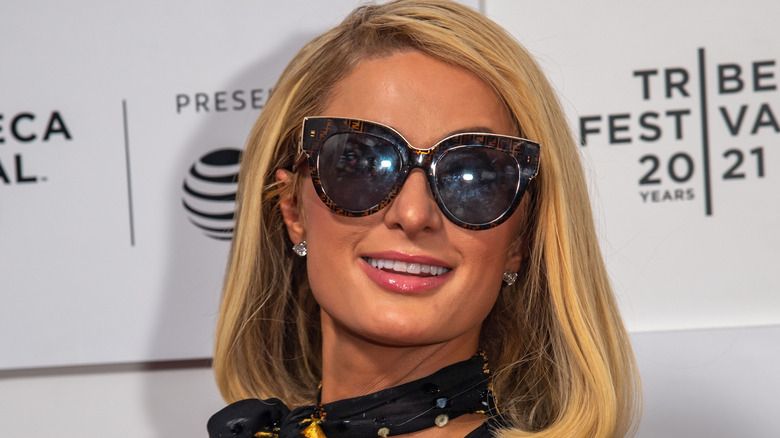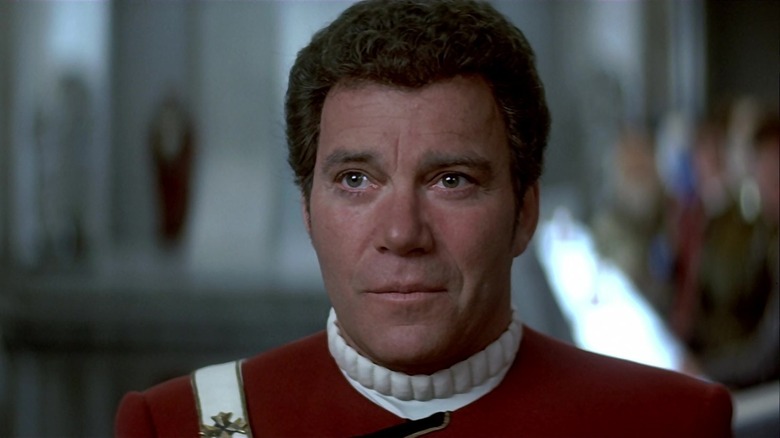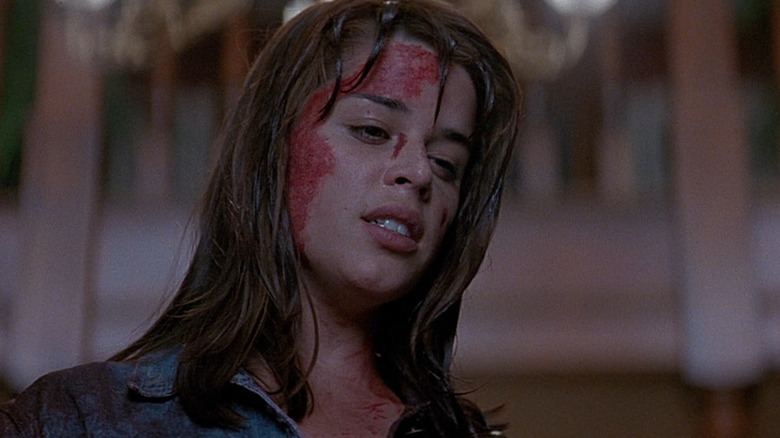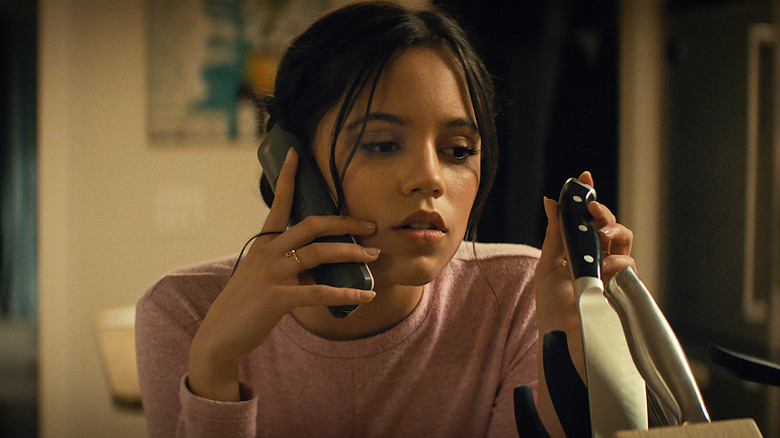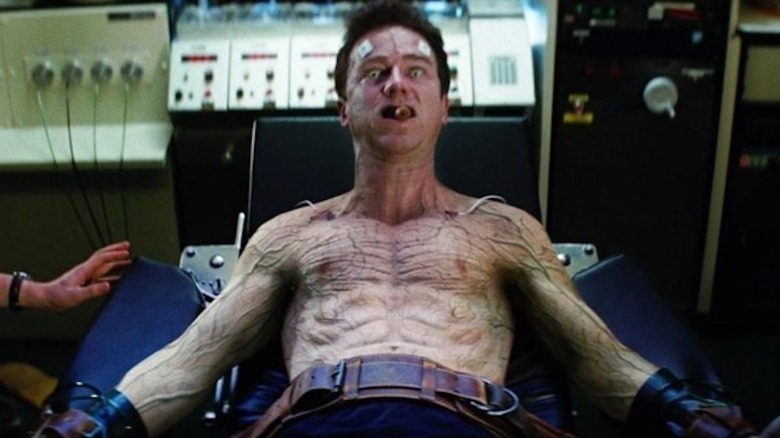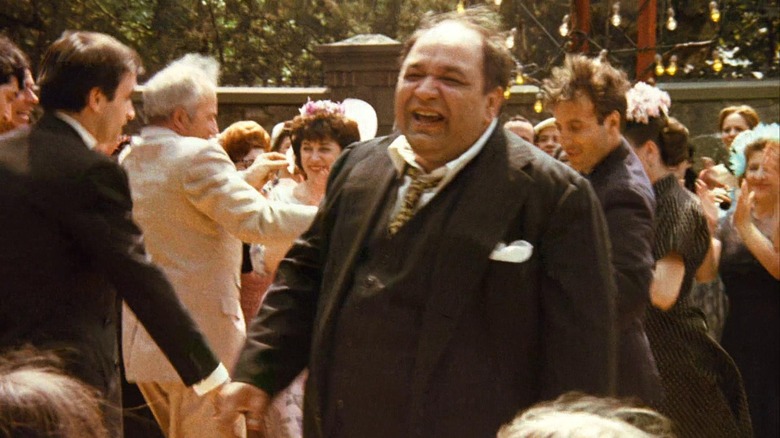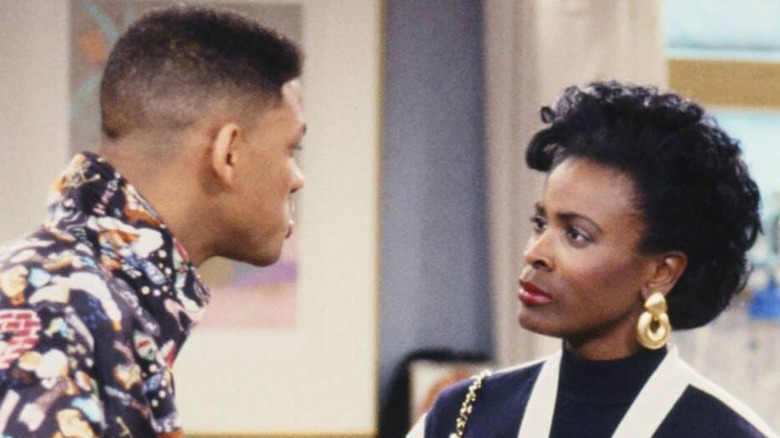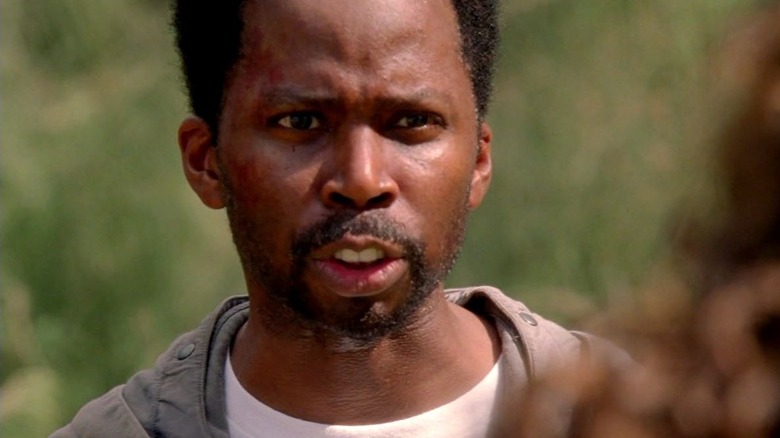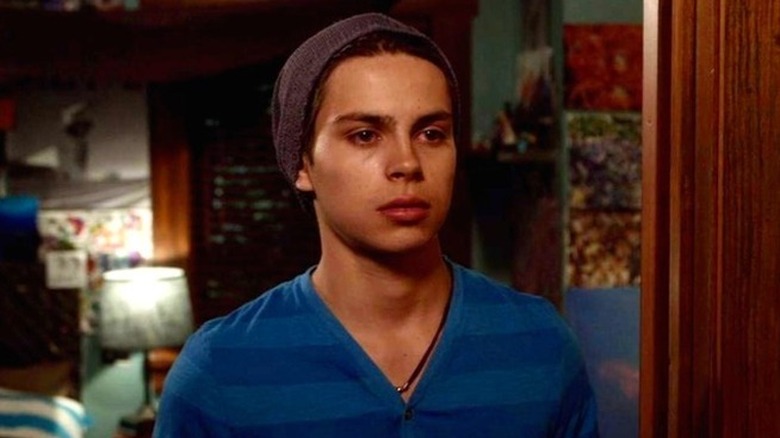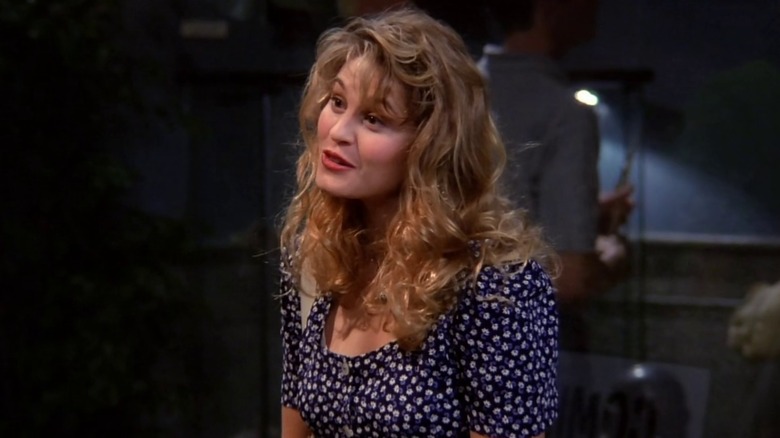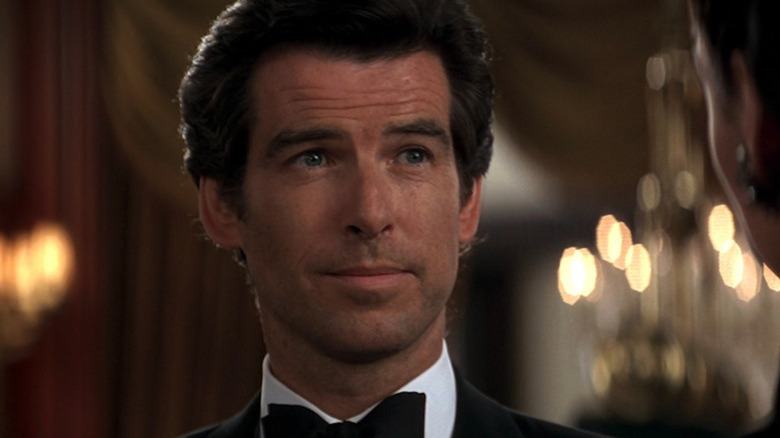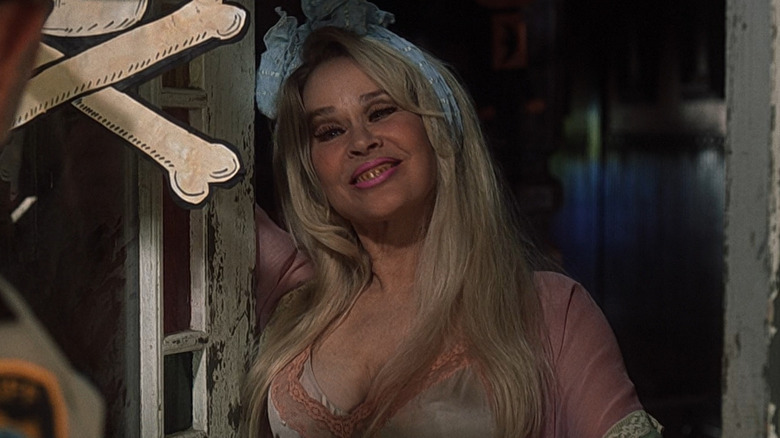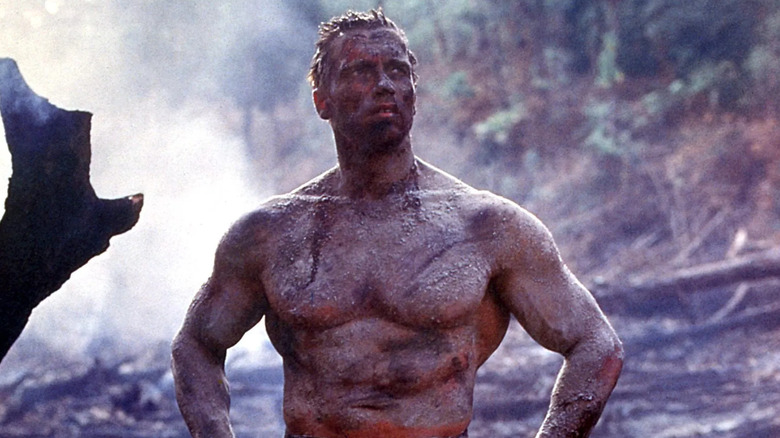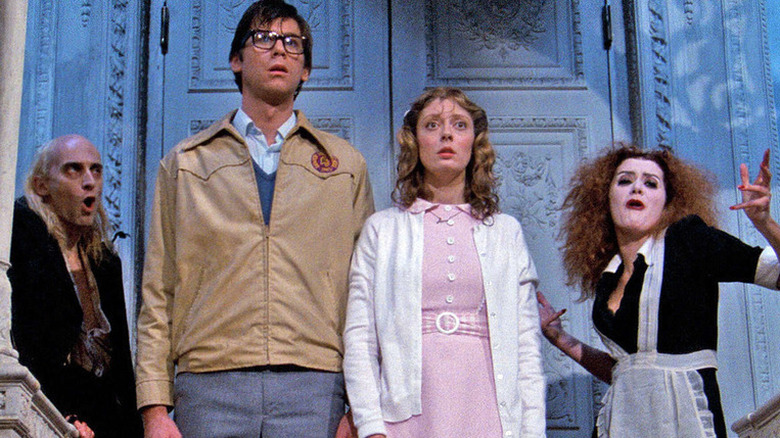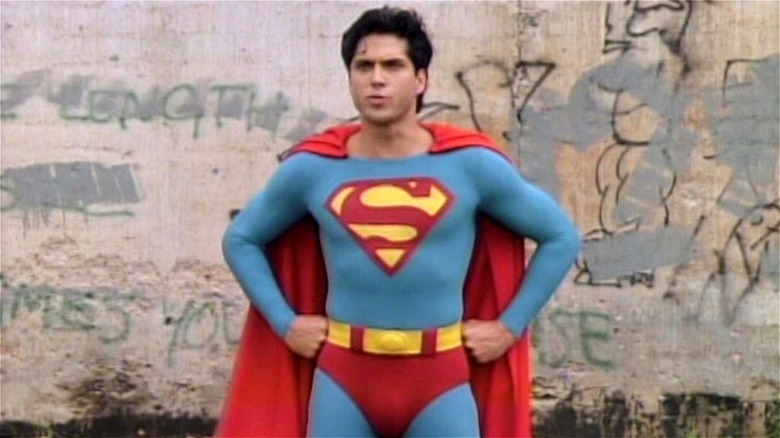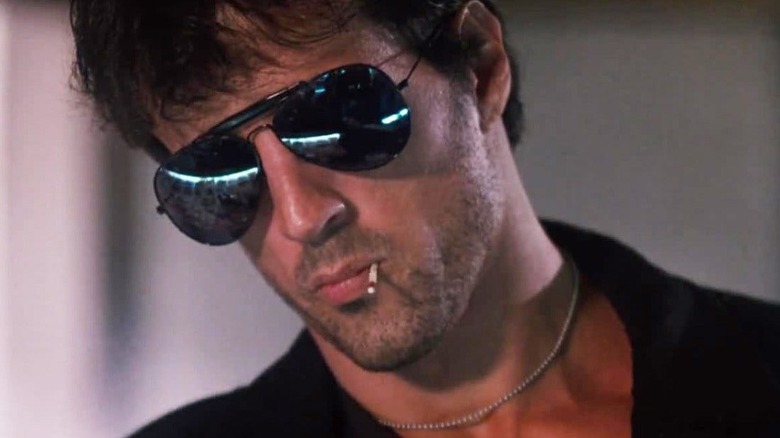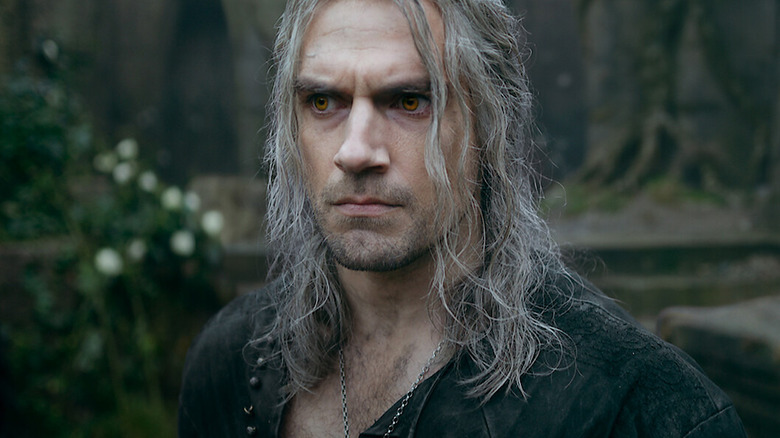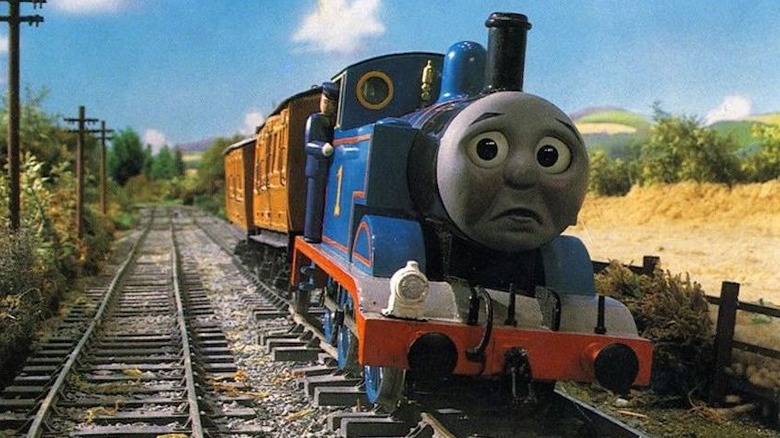Actors Who Got Greedy, Then Got Fired
We tend to think of TV and film productions as enjoying bottomless budgets. Of course, you wouldn't be wrong to think there are mountains of money thrown at big and small screen productions, but at the end of the day, entertainment coffers are still finite. Otherwise, every top-billed Hollywood star would be in every single movie (instead of just Dwayne Johnson being in every single movie), and Weta Digital would be there to whip up something like their Mumakil vs. Rohirrim battle scene for every screen of every theater.
And sometimes, actors find themselves with their noses right up against the limits of what the market will bear. They want more, they say so, and then all of a sudden, a movie fails to be made, a TV show ends, or everything goes as planned ... just without a beloved character. In some cases, you could say the actors are greedy, while in others, they deserve every penny they're asking for and more. And in extreme cases, they ask for so much that it seems like they're pushing the envelope because they want to leave the role. For whatever reason, all of the following actors asked for a bigger slice and lost the whole pie because of it.
Hilary Duff
For three years, the teen comedy "Lizzie McGuire" ruled the Disney Channel roost, with Hilary Duff in the titular role.
Unfortunately, the success of 2003's "The Lizzie McGuire Movie" marked the beginning of the end for the fictional teen sweetheart. That same year, Entertainment Weekly spoke to Susan Duff — Hilary Duff's mother and manager — who said Disney ended negotiations for a film sequel when she asked for a promised bonus to be paid immediately. She also told EW that Disney was trying to shortchange her daughter to continue on the "Lizzie McGuire" series — offering only $35,000 per episode even though they knew she was being offered six figures by outside parties. Both the TV series and the plans for a movie sequel ended.
In 2019, news broke that a revival series was being planned for Disney+, with Duff back in McGuire's shoes. But by the end of 2020, Duff told fans on her Instagram (via Deadline) that the planned series wouldn't happen. Earlier stories said that the revival series — which would begin with McGuire as a 30-year-old — wasn't family friendly enough for Disney+ because of adult topics such as sex and infidelity being mentioned.
Kirstie Alley
When fans first saw 1982's "Star Trek II: The Wrath of Khan," they were likely confused for a couple of minutes. Instead of Captain Kirk (William Shatner) at the helm, the film opens with the young Starfleet officer Saavik commanding the crew of the Enterprise. This eventually proves to be a simulation, and we learn Saavik — a Vulcan played by Kirstie Alley in one of her first roles — is a trainee. But she leaves a deep impression in that first scene and throughout the rest of the film.
Saavik appears twice more in the film series ... but without Alley. In 1984's "Star Trek III: The Search for Spock" and 1986's "Star Trek IV: The Voyage Home," it's Robin Curtis who steps into the role, and then the character disappears forever. So, what happened to the original Saavik?
According to Alley in her 2016 interview with StarTrek.com, it wasn't so much that she asked for more but that she was offered less. "That never made sense to me," Alley said. "Like, you're not paying as much as the first one, and it's a bigger role?" She added that in spite of her asking "sort of gently" the reason for the lowball, she never got an answer and was replaced without explanation.
Crispin Glover
In 1985's "Back to the Future," Crispin Glover played Marty McFly's dad, George McFly. However, the star was not only absent for 1989's "Back to the Future Part II" and its sequel — except for shots recycled from the first film — but his disappearance indirectly led to a lawsuit.
Glover was reportedly unhappy with the script for "Back to the Future Part II" and demanded the same salary as lead Michael J. Fox — $1 million — to return. In 2012, Glover told The A.V. Club this was a lie and that he was offered $150,000 for the sequel, which he claimed was around half the amount offered to Lea Thompson and Tom Wilson, who had similar sized roles. He also said when he tried to negotiate, the offer was actually decreased by $25,000. The following year on "Opie & Anthony," Glover said he did express issues with the script and implied that the studio's supposedly low offer was punishment for his questions.
With Glover out, Jeffrey Weissman stepped into the role, and he was outfitted with a mold made from Glover's face — a mold that turned out to be much more expensive than the filmmakers expected. In 1990, Glover sued the producers of "Back to the Future Part II" for using his likeness without permission. The producers settled for a reported $760,000.
Laurence Fishburne
In 1988's "Die Hard" and its 1990 sequel, Bruce Willis' John McClane takes out the bad guys pretty much on his own. But in 1995's "Die Hard with a Vengeance," he gets a sidekick in the form of electrician Zeus Carver. In a 2020 episode of "The Rewatchables" podcast, Quentin Tarantino said the part of Carver was written specifically with Laurence Fishburne in mind, adding that Fishburne — believing he had the producers over the proverbial barrel — demanded a $1 million payday.
But then came the 1994 Cannes Film Festival, where producer Andy Vajna was impressed with Samuel L. Jackson's performance in "Pulp Fiction." As anyone who's seen "Die Hard with a Vengeance" knows, Jackson took the part of Carver, and the producers escaped Fishburne's barrel. Or so they thought.
In July 1994, before "Die Hard with a Vengeance" made its way to theaters, Fishburne hit Vajna's production company, Cinergi, with a lawsuit for breach of contract. The lawsuit was settled three years later for $750,000 — a couple bucks shy of what Fishburne would've gotten if the producers had agreed to his initial asking price.
Bruce Willis
The action star clown car that is the "Expendables" franchise boasts names like Sylvester Stallone, Arnold Schwarzenegger, Jet Li, Jean-Claude Van Damme, Jason Statham, and many more. Of course, starting with 1988's "Die Hard," Bruce Willis joined the ranks of actors best known for filling bad guys with bullets. And fittingly, Willis enjoys a cameo in 2010's "The Expendables," along with a larger role in the 2012 sequel "The Expendables 2."
But while most fans expected Willis to reprise the role of Church for 2014's "The Expendables 3," it wasn't to be. In August 2013, Sylvester Stallone excitably announced a major cast change on Twitter with, "WILLIS OUT ... HARRISON FORD IN!!!! GREAT NEWS!!!!! Been waiting years for this!!!!"
By the following day, The Hollywood Reporter claimed Willis' exit from the franchise was due to a huge paycheck demand. According to THR's source, "Willis was offered $3 million for four days of consecutive work," and he allegedly demanded a pay bump to $4 million — $1 million per day. The source added that Ford was cast within 72 hours of Willis' exit.
Marcus Chong
Tank — played by Marcus Chong — is one of the few members of the Nebuchadnezzar crew to survive the events of 1999's "The Matrix." But unlike the other three survivors, Tank doesn't show up in either of the sequels, and the story of why swerves into bizarre territory.
The writer/director team of the Wachowskis wanted Chong to reprise the role of Tank, and sources differ on what he was offered. In Chong's own 45-minute YouTube documentary "The Marcus Chong Story," he says the Wachowskis offered him $250,000 to appear in 2003's "The Matrix Reloaded" and "The Matrix Revolutions." Other sources put the figure at $400,000. Regardless, neither amount was enough for Chong, who wanted $1 million. When the Wachowskis said no, Chong resorted to a strange negotiation strategy. Chong had a lawyer send a letter to the Wachowskis in which he asked either for $500,000 ... or he would do the work for free. Apparently, the Wachowskis had enough because they chose option three and had Tank killed off-screen.
In the aftermath, Chong unsuccessfully sued the Wachowskis, their production company Eon, Warner Bros., and AOL Time Warner for breach of contract, slander, and fraud. He was also arrested for allegedly making threatening phone calls to the filmmakers.
Sean Connery
To this day, plenty of fans name the late Sir Sean Connery as their favorite actor who played the sexy spy James Bond. However, the producers who negotiated with Connery may have felt differently.
Connery's first turn as 007 came with 1962's "Dr. No," and he played the charming secret agent in four more feature films before demanding a lot more compensation. By the time Connery starred in 1967's "You Only Live Twice" — for which he was paid $750,000 plus a 25% share of merchandising — the actor was reportedly bored with playing the super spy and demanded $1 million to appear in the next Bond film, plus a percentage of the gross. Producers tried to use George Lazenby as a bargaining chip, but Connery didn't budge. And so, the producers said goodbye to Connery, and Lazenby made his one and only appearances as James Bond in 1969's "On Her Majesty's Secret Service."
According to the documentary "Becoming Bond" (via The Express), in spite of negative reviews for Lazenby's only Bond film, the actor said he was offered a contract for six more movies, which he turned down on his agent's advice. Without Lazenby, United Artists lured Connery back to the world of espionage with a $1.25 million offer for 1971's "Diamonds Are Forever."
Lauren Cohan
Since the early second season of the hit zombie apocalypse drama "The Walking Dead," Maggie Rhee — played by Lauren Cohan — was a staple of the series, but in Season 9, Maggie left the relative safety of the Hilltop Colony to join up with a different band of survivors. At least, that was the narrative reason for her absence.
Behind the scenes, however, Cohan's contract renegotiations for Season 9 hadn't gone the way she'd hoped. Cohan refused to settle for less, and she was written out of the show and went on to star in the ABC action dramedy "Whiskey Cavalier." According to Cohan, in spite of early reports that her only concern was money, she already had one foot out the door before contract negotiations broke down. In a 2018 discussion with Andy Cohen on "Radio Andy," Cohan said she'd already been looking to explore "comedy and happier fare." Talking to EW, Cohan mused that "eight years is a long time to spend in one character."
Thankfully for Maggie fans, the character was written off but not killed off. And in October 2019, news broke that Cohan would be returning to "The Walking Dead" as a series regular for the eleventh and final season. In fact, Cohan showed up early in a recurring role toward the end of Season 10.
Suzanne Somers
In 1980, ABC's "Three's Company" was one of the most successful sitcoms on television. The story about two women and one man living together as roommates in a Santa Monica apartment was a hit, and Suzanne Somers — who played the voluptuous and ditzy Chrissy Snow — thought a pay raise was in order. However, her efforts ended with her getting booted off the show.
The Hollywood Reporter revisited the story of Somers' firing in 2015, saying that Somers was getting paid $30,000 per episode, while co-star John Ritter was bringing home $150,000. When Somers asked for more, ABC offered her a bump of $5,000 per episode, but the actress stood her ground and demanded the same amount Ritter was receiving.
After ABC refused Somers' demand, the actress missed the tapings for Season 5's third and fourth episodes and was soon fired. Before it happened, Somers' manager and husband, Alan Hamel, was allegedly warned. Earlier that year, ABC had bowed to pressure and given raises to Penny Marshall and Cindy Williams, who at the time were the leads of "Laverne & Shirley." Hamel said a friend with connections at ABC called and told him that — not wanting to spare any more big paydays to leading women — the network planned to make an example of Somers.
Terrence Howard
When Marvel fans first met James "Rhodey" Rhodes — who would later become the Avenger known as War Machine — it was Terrence Howard playing the character. But in 2010's "Iron Man 2," it was Don Cheadle in the role, and Cheadle would continue to play Rhodey for the rest of the character's appearances in the Marvel Cinematic Universe.
Howard wasn't happy with his ousting from the MCU, and for a while, he was pretty brazen about letting people know about it. In 2013, on "Watch What Happens Live," Howard told Andy Cohen that when it came time to make "Iron Man 2," Marvel only wanted to pay him one-eighth of what they owed him. He also added that when he reached out to co-star Robert Downey Jr. for help, he was ghosted. Two years later, Howard told Rolling Stone he'd volunteered to take a $1 million pay cut to get Downey cast as Tony Stark in 2008's "Iron Man," though Marvel disagreed with Howard's story.
In 2017, Howard returned to "Watch What Happens Live" and said he and Downey were friends once more. He also claimed he was drunk when he'd appeared on the show in 2013 and blamed his inebriation for what he'd said. He stopped short, however, of saying his initial version of events was false.
Robert Duvall
The first role that made critics take real notice of Robert Duvall was that of Tom Hagen — the shrewd but overcautious consigliere of the Corleone crime family — in 1972's "The Godfather." Duvall earned his first Academy Award nomination for his work in the film, and he reprised the role in 1974's "The Godfather: Part II." But while Hagen survives the events of the first sequel, he's nowhere to be found in 1990's "The Godfather: Part III." Instead, we learn Hagen has passed away in the years between the two stories.
Speaking to Charlie Rose in 2004, Duvall said he left Tom Hagen behind not only because he wasn't offered enough money but because someone else got way too much. "I said I would work easily if they paid [Al Pacino] twice what they paid me, that's fine," Duvall told Rose. "But not three or four times, which is what they did." In 2010, Duvall told Reuters he had no regrets about not appearing in the film since – as many critics and fans agreed – "it wasn't as good as the other two."
Terry Farrell
We're not sure about what kind of raise Terry Farrell asked for during "Star Trek: Deep Space Nine" contract negotiations, only that it was apparently too much. When negotiations broke down, her character, Jadzia Dax, was written out of the show — murdered in the Season 6 finale by the villain Gul Dukat.
There have been different stories told about what happened with Farrell's departure, including versions where money doesn't come into the picture. For example, in a 2011 StarTrek.com interview, Farrell implied she'd left of her own accord, mainly because the work schedule was far too demanding. However, in the 2019 documentary "What We Left Behind," Farrell breaks down in tears while talking about tension between her and the producers during contract negotiations. Most memorably, Farrell says one unnamed producer told her she should agree to whatever salary was offered because if she wasn't on "Deep Space Nine," she'd be "working at K-Mart."
Rob Lowe
When NBC's political drama "The West Wing" premiered in 1999, it looked like Rob Lowe's Sam Seaborn — the idealistic speech writer working for the Bartlett administration — was the main character. But over the course of three seasons, Seaborn's role on the show diminished, and finally, a Season 4 storyline was written to facilitate his departure, though he returned in a recurring role in the show's final season.
Rob Lowe's departure from "The West Wing" wasn't just because he had trouble getting the show to pay him more money. Instead, it was because he was the only lead actor in the series who couldn't get more money. While many of Lowe's co-stars had their salaries doubled since the beginning of the series, his had reportedly remained the same. For example, while CNN put Lowe's compensation at $75,000 per episode, Martin Sheen was receiving $300,000 per episode.
In an official statement Lowe released in July 2002, he said that while he was "grateful" to have been a part of the series, it had been "increasingly clear, for quite a while, that there was no longer a place for Sam Seaborn" on "The West Wing."
Steve Whitmire
Steve Whitmire, the voice of Kermit the Frog for 27 years, was fired by Disney in 2017 and there are at least three different versions of why he was let go. Speaking to The Hollywood Reporter, Whitmire painted himself as the last holdout from before Disney's acquisition of "The Muppets" in 2004. He told THR he was given two reasons for his firing — for being "outspoken" and critical about changes to Kermit, and for refusing to work on a specific project.
Disney and the Muppets Studio had a different story. They told THR Whitmire was "overly hostile and unproductive." In particular, they said his style of negotiation with the studio actually delayed production. The Muppets Studio claimed that rather than being fired over one or two incidences, he was dismissed for patterns of behavior that he'd displayed "over the course of many years."
The day after the THR interview went live, Gizmodo found a much simpler answer — money. An unnamed source told Gizmodo that in spite of Whitmire's claims that he'd been fighting against changes made to "The Muppets," that shortly before his firing the voice actor had confided that it "felt like the good old days again." The source went on to say Whitmire was fired for asking for "too much money," and another source said that "too much money" included a higher salary than any other "Muppets" performer, first class flights to and from his home, and a separate salary for his wife, who worked as Whitmire's manager.
Hugo Weaving
After the Red Skull surprised everyone by appearing on the distant planet Vormir in 2018's "Avengers: Infinity War," it may not have surprised a lot of fans that it was not Hugo Weaving — who originated the role in 2011's "Captain America: The First Avenger" — playing the spectral guide, but Ross Marquand of "The Walking Dead" fame. As early as a year after "The First Avenger" was released in theaters, Weaving told Collider he had no interest in reprising the role, explaining he'd "done [his] dash with that sort of film." Acknowledging he'd signed a multi-picture deal, Weaving insisted he didn't think Marvel would try to force the matter if he said no.
It turns out, however, that Weaving was willing to reprise the role of the Red Skull for "Infinity War" and its 2019 follow-up "Avengers: Endgame," but it wound up being Marvel Studios who tried to change the terms of the actor's multi-picture deal. In 2020, he told Time Out Marvel low-balled him in their re-negotiations. While Weaving didn't give precise figures, he said Marvel offered him "much less ... and this was for two films."
Valerie Harper
The late Valerie Harper was a successful sitcom star throughout the '70s. She rose to fame on "The Mary Tyler Moore Show," eventually earning her own spinoff series "Rhoda." She led her own series again in the '80s, NBC's "Valerie," in which she played a mother trying to raise three sons mostly on her own, with her husband Michael (Josh Taylor) — an airline pilot — often away for work. Coincidentally, the series also proved an early high point in the career of a young Jason Bateman, who played Valerie's eldest son David.
"Valerie" proved a hit and in Season 2, Harper decided to take advantage of the situation. Originally receiving $56,750 per episode, according to People, along with 10 percent of the show's adjusted gross profits, Harper asked for a significant bump to $100,000 per episode and 35 percent of the adjusted gross profits. When NBC said no, Harper stopped showing up for work. NBC came back with a counter — $65,000 per episode and 12.5 percent — but apparently they didn't plan to pay her that for very long, because she was fired after filming only one more episode. Her character was killed off, and the show was first renamed "Valerie's Family" and eventually "The Hogan Family."
Jennifer Lopez
In July 2012, Jennifer Lopez told the world she was leaving her position as judge on "American Idol." She broke the news on Ryan Seacrest's radio show "On the Air" (via TheWrap), just a day after Aerosmith frontman Steven Tyler announced his own exit from the show. At the time, J-Lo told Seacrest she was leaving because "Idol" was monopolizing her time, explaining, "I honestly feel like the time has come that I have to get back to doing the other the things that I have to do."
But it wasn't long before word of a different reason for Lopez's departure emerged. According to TheWrap, Lopez wasn't leaving to devote more time to other pursuits — she was fired. The site claimed that the performer, who was reportedly earning $15 million as an "American Idol" judge, felt she was underpaid and wanted $17 million. According to TheWrap's source, Lopez was let go after the ask, with Fox looking to rework the show because of a steep decline in ratings.
Of course between her musical career, her acting, and more, it's doubtful J-Lo felt much financial hardship in the interim, but even if she had it wouldn't matter much. She was rehired the following year and remained as a judge until the end of the series' time on Fox.
Tobey Maguire
We know, we know — Tobey Maguire was in "Spider-Man 2," along with its follow-up "Spider-Man 3." But, before that could happen, the man who would one day become almost just as famous for the "Bully Maguire" memes as he is for playing the iconic Spider-Man needed to be fired, re-hired, and briefly threatened with being replaced by Jake Gyllenhaal.
As recounted by Screen Crush, when Maguire learned how much Sony had made from 2002's "Spider-Man," his $4 million payday seemed far too small a slice of the pie. So during negotiations, Maguire did something many saw as a tactic — he didn't show up. When he was supposed to report to get his face and body scanned for the visual effects of "Spider-Man 2," Maguire said that — due to "mild discomfort" in his lower back from an injury sustained while filming 2003's "Seabiscuit" — he wouldn't be able to show up for work.
Rather than suffer what they saw as a bluff on Maguire's part, Sony fired him and soon afterward director Sam Raimi and some of the producers met with Jake Gyllenhaal about taking over the role. Maguire reportedly panicked, had his future father-in-law Ron Meyer — then the Vice Chairman of NBC Universal — run interference for him, and won the coveted role back.
Chad Michael Murray
For the first six seasons of the drama "One Tree Hill," Chad Michael Murray played the series' main character and narrator, Lucas Scott. But at the end of the sixth season, Lucas and his wife Peyton (Hillarie Burton) leave Tree Hill, North Carolina with their newborn daughter. After their departure, "One Tree Hill" stuck around for three more seasons.
Burton would later make sexual assault allegations against showrunner Mark Schwahn, saying that was the main reason for her departure, but Murray left because of money. He wasn't shy about the situation, either. While he tried to negotiate a pay raise going into the show's seventh season, the actor told fans, "They're not bringing me back next year ... because they want to save money ... Start blogging and being pissed off."
Apparently whatever blogging or other attempts were made by fans to boost Murray's payday weren't successful, because the final three seasons of the drama unfolded without him, for the most part, although he did make a brief appearance partway through the show's final season in "Last Known Surroundings."
Jaimee Foxworth
There remains no official word on exactly why Jaimee Foxworth's "Family Matters" character disappeared in the show's fourth season, beyond co-creator William Bickley telling People that it was for "budget considerations." In "Mama's Wedding," Foxworth's character Judy — the youngest Winslow daughter — goes upstairs to get dressed and never comes back down. Rather than recast Judy for the show's five remaining seasons, her existence was utterly forgotten. One persistent rumor puts the blame for her departure on the doorstep of Foxworth's mother.
According to an alleged BET article, which has been found mainly in online forums, Gwynn Fox — Foxworth's mother and manager — demanded more money for her daughter and instead Foxworth's contract wasn't renewed. This has never been confirmed, however it could easily be what Bickley was talking about when he mentioned "budget considerations."
Foxworth wouldn't work as an actor on television again, and in later years confessed to difficult struggles including walking a difficult road to sobriety.
John Schneider and Tom Wopat
By 1982, the action comedy "The Dukes of Hazzard" wasn't only one of the most-watched shows on television, it was also a huge source of ancillary revenue for producers and CBS. According to the New York Times, it generated around $125 million in annual sales of T-shirts, toys, and lunch boxes, as well as all the money in from premium advertising rates. The show's stars, actors John Schneider and Tom Wopat (fast-driving cousins Bo Duke and Luke Duke, respectively), thought they were largely responsible for the lucrative popularity of the show and as such thought they should be more fairly compensated for their efforts. In 1982, the two stars threatened to leave the show, demanding that producer Warner Bros. give them a raise in their salaries and a piece of the merchandising profits. Warners, however, literally thought Schneider and Wopat were expendable. They let the actors leave "The Dukes of Hazzard" and then staged a big national search to find two new Dukes. After auditioning more than 2,000 actors, Warner picked Byron Cherry and Christopher Mayer to play Coy and Vance Duke, explaining that Bo and Luke had left home and joined NASCAR.
Warner miscalculated the popularity of Schneider and Wopat. With Cherry and Mayer headlining, "The Dukes of Hazzard" fell from #6 in the ratings to #34 for the 1982-'83 season. They had little choice but to lure back Schneider and Wopat with substantial pay raises.
Marlon Brando
"The Godfather," a universally acclaimed classic of American cinema that was both a box office blockbuster and the winner of many Academy Awards, had a big story to tell about an Italian-American crime family, and a sequel was thoroughly welcomed in theaters in 1974, just two years after the release of the first film. Both a sequel and a prequel, "The Godfather Part II" switches between the continuing adventures of Mafia scion Michael Corleone (portrayed by Al Pacino) and Vito Corleone, detailing his rise to power, with Robert De Niro playing the younger version of the character from "The Godfather" that won Marlon Brando an Oscar.
Francis Ford Coppola, director and co-writer of both films, tried to get Brando to return to the franchise and reprise the role. According to The Daily Mail, in 1973 Coppola sent a letter to Brando to plead his case, writing, "Marlon, I respect you enormously; and if you told me that you did not want to do it, I would accept that and never mention it again." Brando was reportedly scheduled to film his cameo but didn't show up on the shooting day because he was in the middle of a financial dispute with Paramount Pictures.
Will Smith
Just weeks after his long-running hit sitcom "The Fresh Prince of Bel-Air" went off the air, Will Smith got his movie career going in earnest, starring as wisecracking, alien-killing fighter pilot Captain Steven Hiller in "Independence Day," a sci-fi action thriller that became the highest-grossing movie of 1996. Smith zoomed onto the A-list of film stars, becoming one of the top paid actors in Hollywood, headlining big moneymakers like "Men in Black," "Hancock," "I am Legend," and "I, Robot."
Smith wasn't averse to appearing in sequels (he's starred in three "Bad Boys" movies and three "Men in Black" films), but when the long-awaited "Independence Day" follow-up, "Independence Day: Resurgence," finally hit theaters in 2016, Smith wasn't in the cast. His character, Captain Hiller, was said to have died offscreen some time before the events of the film. According to The Independent, director Roland Emmerich started putting the sequel together in 2011, at which time Smith agreed to star in two continuations for a total of $50 million. That, Emmerich said, made the actor's services "too expensive."
Maggie Roswell
In its first 20 years on the air, "The Simpsons" earned $1 billion in profits for Fox, according to Today. Its six main voice performers are paid relatively well for their role in the series, earning as much as $400,000 per episode, according to The Hollywood Reporter. Maggie Roswell served as a supporting member of "The Simpsons" voice cast, appearing frequently (but not in every episode) as auxiliary characters, notably holier-than-thou neighbor lady Maude Flanders. As of the eleventh season of "The Simpsons" in 1999-2000, Roswell's appearances grew more infrequent until she disappeared entirely, what with Maude Flanders' violent, shocking, and darkly comic death — she falls off a racetrack grandstand when hit by a projectile from a T-shirt cannon.
According to the Los Angeles Times, Fox said Roswell left the show of her own accord because she'd grown tired of commuting from her home in Denver to "Simpsons" production facilities in Southern California. Roswell disputed that report, claiming she asked for a raise from her standard $1,500 to $2,000 per episode fee to $6,000. Fox offered an additional $150 per paycheck, so she quit, as that sum didn't cover the cost of a plane ticket from Denver to L.A.
Katherine Heigl
The late TV show creator Garry Marshall — he came up with "Happy Days," "Mork and Mindy," and "Laverne and Shirley" — ended his career by directing a trio of ensemble romantic comedies with multiple, intersecting plot lines that take place around holidays. Before "Mother's Day" and "New Year's Eve," he kicked off the unofficial trilogy with "Valentine's Day," starring a slew of big names, including Julia Roberts, Anne Hathaway, Bradley Cooper, Jennifer Garner, Topher Grace, and Patrick Dempsey. Not among the cast: Dempsey's "Grey's Anatomy" co-star Katherine Heigl.
In May 2009, Page Six reported that Heigl was slated to appear in "Valentine's Day," but during salary negotiations, she and her team asked for a $3 million fee. An insider on the movie said that such a figure was "ridiculous," as every performer on the project would be filming for no more than two weeks and that "no other actors" asked for nearly that amount. Ultimately producers went in a non-Heigl direction.
Tom Cruise
As one of the top-grossing stars in the world, and for more than 30 years at that, Tom Cruise is generally a go-to guy when a Hollywood movie studio wants to spend a ton of money on a big-budget, stunts-and-effects-heavy action movie. In 2008, on the heels of a third "Mission: Impossible" entry and a remake of "War of the Worlds," Cruise was circling his next project: a high-octane spy thriller for Columbia Pictures called "Edwin A. Salt." Cruise was reportedly willing to portray the title character, a CIA operative accused of being a enemy sleeper agent who must evade pursuant authorities and clear his name, but he wanted a sizable fee for his acting services: a whopping $20 million.
Columbia's parent company, Sony, balked at the price tag and backed away from Cruise. The studio ultimately hired Angelina Jolie, and reworked "Edwin A. Salt" into "Salt," a film which earned nearly $300 million at the global box office. Oddly enough, Jolie earned for "Salt" exactly what Cruise had asked for — $20 million.
Grace Park and Daniel Dae Kim
One of CBS's most recognizable and enduring brands, the tropical-set crime procedural "Hawaii Five-O" originally ran from 1968 to 1980, and a reboot returned to typically high ratings from 2010 to 2020. Similar to CBS's many other crime shows, the new "Five-O" was an ensemble series about a tight-knit law enforcement team, predominantly starring Alex O'Loughlin (Steve McGarrett), Scott Caan (Danny Williams), Daniel Dae Kim (Chin Ho Kelly), and Grace Park (Kono Kalakaua).
With production about to start on Season 8 in 2017, Kim and Park entered contract renewal negotiations, teaming up in hopes of getting a better deal. According to reports, Kim and Park asked for raises that would bring them to a salary at or very close to those of O'Loughlin and Caan. CBS refused to give the actors what they wanted, so they quit the show.
A CBS insider assured THR that race wasn't a factor in paying Kim and Park less, but the actors weren't so sure. "I encourage us all to look beyond the disappointment of this moment to the bigger picture," Kim wrote on Facebook. Grace was a bit more diplomatic, telling EW that there were "a number of factors" that contributed to her exit, but that she ultimately walked away because it was "best for [her] integrity."
George Eads and Jorja Fox
Quietly premiering in 2000, "CSI" would become one of the most popular and most imitated shows on television. The ensemble crime procedural about forensic investigators in Las Vegas was the second-most-watched drama on TV by the end of the 2003-2004 TV season, shortly after which original cast members George Eads (Nick Stokes) and Jorja Fox (Sara Sidle) found themselves fired from the franchise-launching series. According to People, Fox and Eads were under contract with CBS, and the network wished to extend, offering a raise of $20,000 per episode each. When Fox and Eads didn't show up to shoot a "CSI" episode in July 2004, network executives took that as a sign of silent protest, that the pay bump was insufficient. (Eads, for his part, claimed he overslept on the day in question. "I woke up white as a sheet 3 1/2 hours after I was supposed to be on the set," he explained.)
CBS's response to the no-shows: It fired Eads and Fox, but then rehired them two weeks later at their old salaries, canceling the $20,000-per-episode raises.
Paris Hilton
In the first decade of the 2000s, few people were as famous or omnipresent as Paris Hilton. Part of the mega-wealthy Hilton family (as in Hilton hotels), Hilton became famous for being a conventionally attractive, club-hopping scenester who parlayed her visibility into a hit Fox reality show ("The Simple Life") and also made a sex tape that was leaked online. Establishing a persona as a disaffected prima donna, Hilton even filed a trademark for her oft-muttered catchphrase, "That's hot."
Hilton was just about at the peak of her fame and influence in 2009 when she secured a small role in "The Other Guys," a police comedy starring Will Ferrell and Mark Wahlberg and directed by Adam McKay. An insider on the movie told Page Six that while Hilton's part amounted to a cameo, in which she portrayed herself, the celebrity's representatives delivered to producers a hefty list of requirements for their client. Among Hilton's needs for her one-day shoot: live lobsters to be cooked at a moment's notice, and top-shelf Grey Goose vodka.
McKay ultimately cut Hilton's appearance from the theatrical cut of "The Other Guys." "The payoff takes too long and stops the movie," he told the New York Times, promising that the deleted scene would appear on the film's DVD. (It didn't.)
William Shatner (Star Trek)
Accurate or not, William Shatner has a longstanding reputation as someone who isn't easy to work with. He's feuded with his "Star Trek" co-stars more than once, from Leonard Nimoy to George Takei, with the latter proving their feud is alive and well by calling Shatner a "prima donna" in a 2022 interview. But it isn't just his relationships with his fellow actors that have given him a reputation as a prickly pear. He's also repeatedly missed out on opportunities to return as Captain Kirk because his pay demands stood in the way, including what would have been a memorable guest-starring role in an episode of "Star Trek: Enterprise."
Ironically, Shatner's insistence on bigger paydays paved the way for the existence of "Star Trek: The Next Generation." In 1986, he demanded a hefty raise to return as Kirk for "Star Trek IV: The Voyage Home," and after the film's overwhelming success, Paramount wanted a new series on the small screen. Concerned over having to lay out big dollars for Shatner — and the rest of the original crew — the decision was made to bring in an entirely new, fresh-faced cast who wouldn't have such lofty demands.
It's especially ironic, of course, because in the early days of "The Next Generation," Shatner had nothing but skepticism and resentment over being "replaced" by Patrick Stewart as captain of the Enterprise. Of course, he would eventually end up teaming up with his replacement rather than being the main star of the 1994 film, "Star Trek: Generations."
Neve Campbell (Scream)
The subject of pay parity has been a controversial topic in Hollywood for years, from Ellen Pompeo famously battling for equal pay on "Grey's Anatomy" to Bradley Cooper offering to share his salary with female co-stars during their negotiations. Well, the subject became a hot-button issue again in 2022 when actor Neve Campbell — who had starred in all five "Scream" films to that point — announced her departure from the franchise over a salary dispute.
Campbell released a statement (published in The Hollywood Reporter) in September of that year after it was reported that she wouldn't return for the sixth film in the series. As she declared in her statement, she wanted a higher salary than the studio was willing to pay, though it was less about greed and more about parity, as the gender pay gap played a significant role in her demands. "As a woman, I have had to work extremely hard in my career to establish my value, especially when it comes to 'Scream,'" Campbell said in her statement. "I felt the offer that was presented to me did not equate to the value I have brought to the franchise."
That wasn't the end of the Campbell/Scream saga, though; just two years later, it was revealed that she was returning for "Scream 7." As noted by Variety, series creator Kevin Williamson had been her biggest supporter, declaring that Campbell deserved what she'd asked for. It appears the studio and the star finally found common ground.
Jenna Ortega (Scream)
The loss of Neve Campbell from "Scream VI" was a big deal at the time, as the actor played an integral part of the main cast of every previous film. Unfortunately, when the studio upped her pay for "Scream VII" to lure her back to the franchise, it seems they pushed out another big name: Jenna Ortega. The actor had joined the franchise in 2022 and returned for "Scream VI." But just as soon as Campbell was announced to be back for the next movie, it was also revealed that Ortega wasn't returning for the seventh installment, as she wanted a bigger deal than she'd been offered.
A piece in The Hollywood Reporter — which also discussed co-star Melissa Barrera's dismissal over her support for Palestinian freedom — revealed that Ortega had parted ways with the project after she demanded a sizable pay increase. According to the report, Ortega felt that with her newfound A-list status, she should no longer be paid like the up-and-comer she was when she was first cast.
There is logic to her thinking: Ortega had been more of a child starlet just a few years earlier when she joined the franchise but was now an in-demand leading lady, having headlined the smash hit Netflix series "Wednesday" and then the long-awaited Tim Burton "Beetlejuice" sequel, "Beetlejuice Beetlejuice." Unfortunately, the studio wasn't willing to pony up the extra cash (possibly because they had to shell out more to convince co-star Campbell to return), and, suddenly, Ortega was on the outside looking in.
Edward Norton (The Incredible Hulk)
In 2008, the Marvel Cinematic Universe was born with the release of two movies: "Iron Man" and "The Incredible Hulk." Embattled actor Robert Downey Jr. was a risky choice for the former, while Oscar-nominated Edward Norton was seen as the sure thing to help the latter be a monster hit. In the end, it was Downey who became the MCU's leading man, while Norton's many demands led him to ultimately lose the role of Bruce Banner in one of the biggest scandals to rock the MCU.
The trouble started during production on "The Incredible Hulk" when Norton insisted on contributing to the script, only to come into conflict with a studio that had a very different vision for the film. As a result, when it came time to make "The Avengers," the studio was understandably nervous about Norton's demands interfering with the star-studded cast formed of actors from no fewer than three separate superhero franchises.
Over the years, as more information about the studio's falling out with Norton came to light, it became clear that the actor simply wanted more than he could get. Marvel architect Kevin Feige himself has commented on what happened ahead of production on "The Avengers." According to him, the real reason that Norton was fired from the MCU was out of a desire for actors who embody "the creativity and collaborative spirit of our other talented cast members," suggesting that the actor's desire to exert control over the production was simply too much for Marvel to bear.
Richard Castellano (The Godfather)
A character actor whose career mostly consisted of playing unnamed tough guys in random movie and TV projects, Richard Castellano became iconic after playing Clemenza, a quasi-mentor to Al Pacino's Michael Corleone in "The Godfather." With an important role in a critically acclaimed, award-winning smash hit, you might think the actor would have hit it big after, but instead, he mostly faded back into obscurity. Part of it might be his own fault, as he lost his opportunity to star in the sequel after negotiations broke down.
For years it was assumed that Castellano had walked away over a salary dispute, but in a 1981 interview with the New York Post, the actor himself denied the allegation. Instead, he claims that, after an unpleasant experience with director Francis Ford Coppola on the first "Godfather" film, he was irked by requests the filmmaker was asking of him physically after agreeing to a deal on his return. "[Coppola] had me losing weight to play Clemenza as a young man," he told the outlet. "I was down to 194 pounds. When I received the script five minutes later, it had me rolling in at 300 pounds."
Coppola, for his part, has more recently claimed that Castellano balked at the script and wanted control of his own dialogue. Whatever the reality, it's pretty clear that Castellano wanted something that Coppola wasn't willing to provide, fair or otherwise.
Janet Hubert (The Fresh Prince of Bel Air)
Much has been made over the years about the tumultuous feud between Will Smith and Janet Hubert, costars on the iconic late-'90s sitcom "The Fresh Prince of Bel Air." Trouble behind the scenes was, for many years, believed to be the reason that the actor was booted from the show and replaced by Daphne Maxwell Reid, who stepped in to play Will's aunt, Vivian Banks, for the second half of the series' run. But while the friction between the two stars may have been a factor in Hubert's exit, it was her demand for a pay raise that apparently played a bigger role, though that revelation wasn't made until decades later.
"They offered me this really bad deal in the third season," Hubert revealed during a special reunion show that aired on HBO Max in 2020. "They said, 'You've got two months and two weeks of work, and you cannot work anywhere else.' So that meant my salary was cut, I had a new baby and a husband who was out of work." Hubert made the comments as a way of clarifying the fact that, despite common belief, she wasn't actually fired. "I said no, I did not accept their offer. I was never fired. So the misconception was always put out there." Nevertheless, the result was that Hubert found herself all but blacklisted in Hollywood as a woman demanding more than the studios offered, with an unfair reputation for ruffling feathers behind the scenes.
Harold Perrineau (Lost)
In the late 2000s, there was no hotter show than "Lost," the survival drama that quickly turned into a sci-fi adventure as the story unfolded. Born from the mind of J.J. Abrams, a key part of what made the series so engrossing was its strong ensemble cast. Over the course of the show's run, actors came and went, leaving the island by fate or by death and routinely throwing viewers for a loop. One of the first major cast changes to occur was the departure of Harold Perrineau, who played Michael, the stranded castaway father of pre-teen son Walt. What many may not have realized at the time, though, is that it was Perrineau's demand for more that led to his exit.
It wasn't more money that Perrineau was after, though. On the contrary, the actor simply wanted more to do. He'd joined the show with the promise of equal parts for the cast, but the actor quickly noticed that the show was only really focusing on the three white characters, Kate (Evangeline Lilly), Jack (Matthew Fox), and Sawyer (Josh Holloway), while minority characters like Michael, Sayeed (Naveen Andrews), Jin (Daniel Dae Kim), and Sun (Sun-Hwa Kwon) were often sidelined ... and he made his displeasure known.
"I don't have to be the first, I don't have to have the most episodes — but I'd like to be in the mix," a producer quoted Perrineau as saying in the book "Burn It Down: Power, Complicity, and a Call for Change in Hollywood." Despite the promise made to the star when the series launched, the producers didn't have an expanded part in mind for his character, and, rather than deal with an unhappy star, Michael was slowly phased out of the story.
Jake T. Austin (The Fosters)
In 2013, "Queer as Folk" alum Peter Baige co-created the ABC Family teen drama "The Fosters." Praised for its depiction of LGBTQ issues, the series centered on a pair of lesbian parents who raise a family of adopted teens and ran for five seasons. The show's biggest strength was its young ensemble cast, including Jake T. Austin ... at least, at first. The young actor started the series playing Jesus Foster, the adopted son of Stef (Teri Polo) and Lena (Sherri Saum), and twin brother to Mariana (Cierra Ramirez). After the first two seasons, though, he was replaced by Noah Centineo in the role when Austin had bigger hopes for his character.
In a now-deleted tweet, Austin settled speculation surrounding his departure from "The Fosters," making it clear that it wasn't about money but a desire to do more with the character. According to his tweets, Austin was informed that Jesus would have a much smaller role in the third season. Despite asking for more screen time, the show didn't budge, and Austin was out. In an ironic twist of fate, the character of Jesus — now played by Centineo — wound up appearing in more than half of Season 3's 20 installments and, ultimately, a total of 53 episodes over the three seasons he was with the show.
Anita Barone (Friends)
Easily one of the biggest sitcoms of the '90s and 2000s, "Friends" made stars out of every cast member and even some of its recurring favorites. One actor who never got that superstar treatment, though, was Anita Barone, whose role on "Friends" lasted just one episode, even though the character continued to appear on the series for years.
In the first season, Barone played Carol Willick, the ex-wife of Ross (David Schwimmer), who left him at the start of the series after coming out as a lesbian. Appearing in the second episode of the series, Carol turns up to tell Ross that she's pregnant with his child — but Barone was reportedly unhappy that her character wasn't going to appear very often. Looking for a more full-time role, the part of Ross' ex-wife just wasn't big enough to satisfy her wants, and so she exited the series after that single appearance. Eventually, when the character returned — with Ross' son, Ben, in tow — she was played by a different actor, Jane Sibbett, who continued to appear as Carol over the next decade.
Of course, if Barone had any idea of just how big "Friends" would become — running for ten seasons and routinely sitting at the top of the ratings — she might have stuck it out. Still, she did pretty well for herself, securing bigger roles on shows like "The Jeff Foxworthy Show," "The War at Home," and "Shake it Up." Most recently, she appeared in the Hulu series "A Million Little Things."
Pierce Brosnan (James Bond)
It may be surprising to learn that Pierce Brosnan is one of many actors who refused to play James Bond — surprising, that is, because years later he did take on the role, playing 007 across four feature films in the 1990s and early '00s. But what may come as an even bigger surprise is that Brosnan was almost the face of the gritty reboot, "Casino Royale," before Daniel Craig was chosen to be the new face of the franchise in 2005.
Even after Craig took over, "Royale" had many connections to Brosnan's earlier version, including Judi Dench reprising her role as M and director Martin Campbell returning to the franchise after helming "Goldeneye" in 1995. But Brosnan's absence was the biggest disconnect, making it clear that this was a whole new reinvention of the Bond mythos. Had it not been for Brosnan's hefty salary demand, he would have been behind the wheel of the Aston Martin one more time.
One might criticize the studio for not meeting the star's asking price, as Brosnan was and is beloved in the role, despite some of his Bond films being disappointments. But as was reported at the time, way back in 2005, Brosnan demanded an eye-popping $45 million to come back and ask for another shaken martini. In the end it was probably the right choice, as Craig — despite facing early criticism — went on to become a fan favorite, starring in five Bond flicks before bowing out after "No Time to Die" in 2021.
Karen Black (House of 1000 Corpses)
Heavy metal rocker and White Zombie lead singer Rob Zombie spread his wings in the 2000s, entering the world of Hollywood as a director with his debut film, "House of 1000 Corpses." Released in 2003, the low-budget horror splatterfest stars Sid Haig, Bill Moseley, Sheri Moon, Karen Black, Rainn Wilson, and Walton Goggins. A cult favorite, the film received a sequel two years later, "The Devil's Rejects," and much of the main cast returned. But Karen Black — who played the twisted killer known as Mother Firefly in the first film — wasn't among them.
In an interview with Zeta Minor, director Rob Zombie said that he wanted Black to reprise her role, but tough negotiations got in the way. "I didn't replace her on purpose," Zombie explained. "As we came down to the wire and people were signing their deals and all the final things were being done, Karen just had a problem with something and we tried to resolve it and couldn't and I had to move on." Ultimately, the swap didn't seem to make much of a difference to audiences; the film has even better reviews than its predecessor.
Black, meanwhile, died in 2013, but it doesn't sound like the falling-out over money created any animosity between her and Zombie. Just prior to her passing, her former "House of 1000 Corpses" director sent a message of support in her struggle with cancer, even asking fans to donate to her GoFundMe campaign.
Arnold Schwarzenegger (Predator)
Despite returning again and again to the "Terminator" franchise, Arnold Schwarzenegger isn't really known for his sequels, as most of his most beloved films never saw an Arnie-led follow-up. So when the 1987 sci-fi action classic "Predator" franchise expanded with a sequel in 1990, instead of the Austrian Oak, "Lethal Weapon" star Danny Glover faced off with the monstrous alien from outer space. It came to light years later, however, that Arnie was slated to star in "Predator 2" until contract talks stalled over his salary demands and he ended up walking away.
Speaking with Collider in 2011, producer John Davis explained that the studio was very close to securing the services of Schwarzenegger — closer than many may realize. More surprising is the fact that the difference came down to what today might seem like a modest sum, with Davis saying that "the deal broke down over $250,000." As a result, the musclebound star was swapped out for Glover, and the setting of the film shifted from the jungle to the city of Los Angeles. And while many fans might argue that the sequel is a worthy successor, few would disagree that having Arnold return to face off with another alien hunter would have likely made it even better than it was.
Of course, it's also worth noting that the film Arnold made in lieu of "Predator 2" was one of his finest, 1990's "Total Recall," so perhaps it was all for the best.
Susan Sarandon (The Rocky Horror Picture Show)
"The Rocky Horror Picture Show" is an iconic cult classic that has endured for decades, but before that, it was a box office bomb (albeit one that still got a sequel). Though far less known, 1981's "Shock Treatment" brought back many of the characters from the original horror-themed musical. But out of all the names in the main cast — including Tim Curry and Meat Loaf — only Richard O'Brien (who happens to be the film's writer and the creator of the original stage play) returned, playing the hunchback, Riff Raff. Stars Barry Bostwick and Susan Sarandon — who'd played young newlyweds Brad and Janet in "Rocky Horror" — were replaced, all because Sarandon wanted more money to reprise her role.
Bostwick made the surprising revelation in an interview with Orlando Weekly in 2022, explaining why he didn't return for the follow-up. "I was never asked because they asked Susan first and she apparently wanted too much money." As the actor explained, the filmmakers weren't interested in having him back if Sarandon wasn't going to be on-screen with him. "I think they felt that if they're going to get a new Janet they have to get a new Brad. It would just look like a marriage gone bad," he said. In the end, "Shock Treatment" was an even bigger box office flop and never gained anything close to the notoriety of its predecessor.
John Haymes Newton (Superboy)
Over the years, plenty of actors have become famous for playing Superman, from George Reeves and Tyler Hoechlin on television to Christopher Reeve and Henry Cavill in the movies. But in the late 1980s, not one but two different actors took on the role of Superboy in the eponymously titled TV series that ran for four seasons. The show chronicled Clark Kent's days as a teenager, but the character was more of a Superman than a Superboy. Nevertheless, while it's Gerard Christopher who often gets the credit for playing the title role (he starred in Seasons 2, 3, and 4), it was John Haymes Newton who originated the role in Season 1 — and who lost his job because he wanted more money.
In an interview with Superman Homepage in 2002, Newton reflected on his brief time as the series' lead, telling the outlet that his departure wasn't exactly a firing but was instead the result of him demanding more money. "It was my choice to leave. The producers asked me back repeatedly," Newton said. "I asked for a small raise (20%) due to the amount of dangerous stunts I was performing."
Newton alleged that the studio also tried playing dirty, using Hollywood politics by citing a legal issue he was facing at the time. But he also acknowledged that the way he went about negotiations didn't do him any favors. "To make a long story short, if I could, I would go back and do things differently."
Sylvester Stallone (Beverly Hills Cop)
One of the biggest action stars in Hollywood history, Sylvester Stallone has several iconic characters to his name, from John Rambo to Rocky Balboa. But he almost had another in his pantheon of greats, coming close to playing Axel Foley in "Beverly Hills Cop." The film, which went on to help Eddie Murphy become one of the biggest names on the block in the '80s and '90s, was originally developed for Stallone to star in. The actor even worked alongside producers to craft the project, and, in the process, he made demands that the studio wasn't willing to meet.
Chief among Stallone's asks was to turn the film from a comedy to a no-holds-barred action film. According to director Martin Brest, Stallone actually created a script of his own, having previously penned multiple "Rocky" and "Rambo" films. "That's not what the studio really was looking to do," Brest recalled in an interview with Variety in 2023. But that wasn't the end of Stallone's part in the project — at least, his version of the project. Because, rather infamously, Stallone took his script, changed the names, and turned it into its own action movie, separate from "Beverly Hills Cop."
"We wound up getting Eddie Murphy a few weeks before shooting," Brest told Variety, and the rest was history. Murphy got his starring role — and Stallone got to make the much less successful action movie, "Cobra."
Henry Cavill (The Witcher)
Fan-favorite actor Henry Cavill made a name for himself as Superman, playing the Man of Steel in 2013's film of the same name. Rising to superstardom faster than a speeding bullet, Cavill quickly found himself one of Hollywood's most in-demand action stars, a development that led to his casting in the title role of the Netflix fantasy epic, "The Witcher." A fan of the books on which the series is based, Cavill threw himself into the role and was a big reason the show became an instant hit with audiences.
Perhaps feeling the power of his newfound A-list status, or maybe just because he's an obsessive fan of the franchise he was starring in, Cavill reportedly butted heads with producers and writers over the direction of the series and the portrayal of his character in particular. Whether it was demanding script changes or just being heavy-handed around the set, Cavill found himself an enemy on his own series, and, by all accounts, it was the star's demanding nature — rightly or wrongly — that led to his ultimate dismissal. It was soon revealed that Liam Hemsworth would step into the role for the show's fourth season.
At the time, many speculated that Cavill was leaving the series to focus on playing Superman again. But despite his highly-touted return as Kal-El in "Black Adam," it was announced shortly after that film left theaters that his version of Superman was being put out to pasture, too.
Martin T. Sherman (Thomas and Friends)
It's not just on-screen actors who find themselves on the unemployment line when they get greedy. Voice actors, too, can find themselves in the same situation, although we don't hear about it quite as much, possibly because voice roles are typically far less publicized than their live-action counterparts. But just such a scenario played out on, of all places, the children's classic "Thomas and Friends," the series based in the fictional burg of Sodor and revolving around the iconic character Thomas the Tank Engine.
Voice actor Martin T. Sherman played multiple characters on the U.S. version of the show for several years across more than a hundred episodes, most importantly providing the voices for Percy, Diesel, and Thomas the Tank Engine himself. In the end, it wasn't exactly greed that put Sherman out of work, but a desire to be paid fairly. "For the last five years it has been my great honor and pleasure to create the American voices of Thomas the Tank Engine and Percy," Sherman said in a statement published by The Hollywood Reporter in 2014. "Unfortunately, I must now quit the show. It is embarrassing but the reason is that they are paying a very low wage. The terms they are offering are so poor, and this with the immense success of Thomas, that the only right thing for me to do is walk away."
